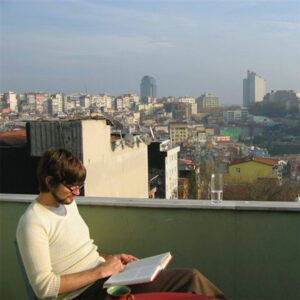
Dr. Jeremy Francis Walton · GSH
Max Planck Institute for the Study of Religious and Ethnic Diversity · Göttingen, Germany
Biography
Jeremy F. Walton is a cultural anthropologist whose research resides at the intersection of memory studies, urban studies and new materialism. He leads the Max Planck Research Group, “Empires of Memory: The Cultural Politics of Historicity in Former Habsburg and Ottoman Cities,” at the Max Planck Institute for the Study of Religious and Ethnic Diversity. Dr. Walton received his Ph.D. in Anthropology from the University of Chicago in 2009. His first book, Muslim Civil Society and the Politics of Religious Freedom in Turkey (Oxford University Press, 2017), is an ethnography of Muslim NGOs, state institutions, and secularism in contemporary Turkey. Prior to his current position, he held research and teaching fellowships at the Center for Advanced Studies of Southeastern Europe at the University of Rijeka, the CETREN Transregional Research Network at Georg August University of Göttingen, Georgetown University’s Center for Contemporary Arab Studies, and New York University’s Religious Studies Program. He has published his research in a wide selection of scholarly journals, including American Ethnologist, Die Welt Des Islams, and History and Anthropology. He is also the co-editor of several volumes, including Anthropology and Global Counterinsurgency (University of Chicago Press, 2010). “Empires of Memory,” which he designed, is a groundbreaking interdisciplinary project on post-imperial memory in post-Habsburg and post-Ottoman realms.
Education and positions held
- 2016 – present
- Max Planck Institute for the Study of Religious and Ethnic Diversity (MPI-MMG), Göttingen, Germany. Max Planck Group Leader for the Max Planck Research Group “Empires of Memory: The Cultural Politics of Historicity in Former Habsburg and Ottoman Cities.”
- 2015 – 2016
- University of Rijeka, Croatia. Center for Advanced Studies of Southeastern Europe. Research Fellow.
- 2013- 2015
- Georg August University of Göttingen, Germany. CETREN Transregional Research Network.Postdoctoral Research Fellow in “The Politics of Secularism and the Emergence of New Religiosities.”
- 2012 – 2013
- Georgetown University, Washington D.C., USA. Center for Contemporary Arab Studies (CCAS), Edmund A. Walsh School of Foreign Service. Jamal Daniel Levant Postdoctoral Fellow.
- 2009 – 2012
- New York University, New York, NY, USA. Assistant Professor and Faculty Fellow, Religious Studies Program, affiliated with the NYU Department of Middle Eastern and Islamic
Studies.
- New York University, New York, NY, USA. Assistant Professor and Faculty Fellow, Religious Studies Program, affiliated with the NYU Department of Middle Eastern and Islamic
- 2000 – 2009
- University of Chicago, Chicago, IL, USA. Department of Anthropology. MA received in 2003, PhD received in 2009.
Research Summary
The empires that once defined the political geography of Europe are no more. One cannot meet a Prussian, Romanov, Habsburg, or Ottoman today; these dusty categories of affiliation have ceded to myriad national communities. Nor do British, French, Dutch, Spanish, or Portuguese identities articulate the same horizons as they did at the height of their respective colonial empires. Yet it would be mistaken to assume that Europe’s bygone empires have become mere relics of history. Imperial pasts continue to inspire nostalgia, identification, pride, anxiety, skepticism, and disdain in the present. The afterlives of empires as objects of memory exceed historical knowledge, precisely because these afterlives shape and recast the present and the future. My research group, “Empires of Memory: The Cultural Politics of Historicity in Former Habsburg and Ottoman Cities,” is dedicated to the multiple legacies and memories of empire in the cities of southeast and central Europe. Eight cities orient our pursuit: Vienna, Istanbul, Budapest, Sarajevo, Thessaloniki, Trieste, Zagreb, and Belgrade.
Key publications
- 2019 “Introduction: Textured historicity and the ambivalence of imperial legacies.” History
and Anthropology 30 (4): 353-365. DOI: 10.1080/02757206.2019.1612387 - 2019 “Sanitizing Szigetvár: On the post-imperial fashioning of nationalist memory.” History
and Anthropology 30 (4): 434-447. DOI: 10.1080/02757206.2019.1612388 - 2017 Muslim Civil Society and the Politics of Religious Freedom in Turkey. Oxford University
Press. Titled published in the American Academy of Religion’s “Religion, Culture &
History” book series. - 2016 “Geographies of Revival and Erasure: Neo-Ottoman Sites of Memory in Istanbul,
Thessaloniki, and Budapest.” Die Welt Des Islams 56: 510-532. DOI: 10.1163/15700607-
05634p11 - 2013 “Confessional pluralism and the civil society effect: Liberal mediations of Islam and
secularism in contemporary Turkey.” American Ethnologist 40.1 (February): 182-200.
DOI: doi.org/10.1111/amet.12013
